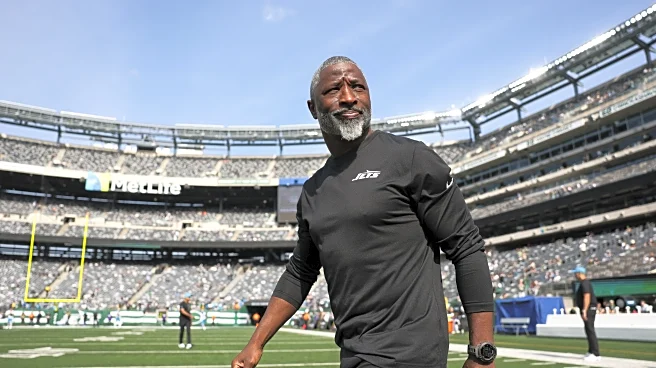I’m sure many of you did a double take reading that headline.
To answer some of the questions the title likely raised, yes, I have watched the Jets this season. I do understand the team has a glaring need
at quarterback both immediately and in the long term. I have seen whichever successful young quarterback you want to mention and how he has impacted his team.
Today the number two and three ranked quarterbacks according to QBR are Daniel Jones and Sam Darnold respectively. Baker Mayfield is number eight. These are all quarterbacks who were selected with top six picks in their respective NFL Draft classes and were discarded by their original teams. At the time they were cast away, they were viewed as massive disappointments.
We could even toss in current number seven rated passer Jared Goff. He had a higher level of success with his initial team, going to a Super Bowl in 2018 as Rams starting quarterback. By the time the Rams traded for Matthew Stafford, maybe viewed Goff’s part in that trade as a salary dump. The reason the Rams made the trade was they didn’t think they could win a championship with Goff as their starting quarterback. To their credit, they did win a championship in year one with Stafford as their quarterback, but the Lions have helped Goff reach a level that even noted offensive guru Sean McVay struggled to help him achieve.
Recently in The Athletic, Zak Keefer wrote an exceptionally detailed piece on how NFL teams bare responsibility for their failures of young quarterbacks. It’s as thorough of an explanation of how dysfunctional franchises fail the players they have invested in as anything I have ever read. I highly encourage you to click and give it a read. It offers insight from coaches, players, and other insiders on the inner workings of NFL teams.
Of course players do bear responsibility for their own shortcomings. It’s very easy to blame a team when the player just isn’t good enough. Still, the recent ascendence of players who were written off early in their respective careers suggests there’s something to the idea that teams have to take a significant portion of the blame when things don’t work out. Just reading some of the anecdotes from The Athletic piece will offer a great degree of insight as to why the Jones, Darnold, and Mayfield types are written off when there’s more to the story.
At the risk of oversimplification, it becomes clear that there are two types of franchises that pick quarterbacks in the NFL Draft.
- Franchises with a plan to support the quarterback.
- Franchises who hope the quarterback will be their savior.
To take it a step further, I’ll submit that there are three types of quarterbacks who are selected early in the NFL Draft.
- Unicorns who can actually carry their franchise.
- Players with skills who can succeed but only if they have the proper support.
- Players who were misevaluated and really shouldn’t have been selected early.
You see it over and over. Teams pick a player hoping they are type 1. They are actually type 2 but get written off as type 3 because they are thrown into a hopeless situation where too much is asked of them.
One thing I’ve noticed in the NFL Draft in general (not just at quarterback) is that the league tends to be pretty good at separating good from bad in scouting evaluations but not at separating great from good.
There are absolutely some quarterbacks who fit type 3 and are overdrafted, but I think they are probably in the minority.
I would argue most are in type 2 at least early in their careers. Look, nobody is going to land in the situation Troy Aikman was in with the Dallas Cowboys as they launched their dynasty in the early 1990s with the league’s best offensive line, a top two running back, a top five receiver, and top five offensive coordinator. But they need enough pieces around them to have a chance of success. They can’t be asked to carry the franchise at the early stage.
If you find a type 1 quarterback who can elevate the team early in his career, that’s great. It’s a franchise altering type of thing. There just aren’t many out there, and they aren’t easy to find. Furthermore, you can’t assume you are going to find one. It just kind of happens.
They aren’t easy to scout either. Again, the NFL differentiates between good and bad far better than between great and good.
Trevor Lawrence was supposed to be a slam dunk type 1 quarterback who could elevate any franchise to new heights. Five years into his career, he profiles as a type 2 quarterback (and one at the lower end of tier 2 at that).
Justin Herbert seemed to be a project coming out of Oregon, but he has more or less been a top ten quarterback since the day he set foot on the field. Who saw him as a type 1 guy out of the gate? Not many.
Drake Maye had his fans, but even many of them thought he would need some help to reach his potential. Now he appears on the cusp of type 1.
I think you have to assume if you pick a guy early, he’s a type 2 quarterback, and you count your blessings if he turns out to be a type 1 franchise quarterback who elevates anything.
With type 2 quarterbacks, the relationship between player and team is self-reinforcing. A stable team with a good plan who puts good pieces around the quarterback will get good results. The team helps the quarterback to succeed, and the quarterback helps lift the team to new heights.
A bad team might have put zero pieces around the quarterback. They probably don’t have good coaching. In fact, there’s a good chance the coach is on the hot seat and relying on the quarterback to singlehandedly save his job. It’s the reverse of the way these things should work. The team is supposed to lift up the quarterback. The rookie quarterback shouldn’t have to solve everyone else’s problems.
If all of the failures and subsequent success of type 2 quarterbacks with new teams have taught us anything, context matters.
If they have taught us a second thing, it’s that teams without the correct infrastructure in place are better off passing on quarterbacks in the Draft than picking someone they cannot support. We don’t need to go that far for examples. Think about all of the young quarterbacks the Jets have used high picks to select without the proper infrastructure to develop them properly.
That brings us to our current Jets situation. I think it’s fair to say the team as presently constituted is a mess. There is one quality wide receiver on the roster. The offensive line is of questionable caliber. The best running back is likely to leave before next season either through trade or free agency.
More than anything, it isn’t clear that the Jets have the quality coaching staff needed to properly develop the quarterback. If you read that article in The Athletic, you will be struck by the extent to which inept coaching staffs hold back the progress of young quarterbacks.
I have come to the conclusion that developing a quarterback is so hard, and the role of coaching is so critical that a staff should have to earn the right to pick a quarterback early by displaying competence. So far with the Jets, we have gotten the opposite of competence. Maybe Aaron Glenn and his crew can right the ship by the end of the year. We can reassess if so. Right now, it’s a tough argument to make that Glenn and particularly Tanner Engstrand have displayed the quality that makes successfully developing a quarterback likely.
Based on the way this season is playing out, there is a real chance Glenn and the current staff will begin 2026 on the hot seat. We will play out the very scenario that sinks so many quarterbacks. They are tasked with saving the franchise. Most likely your coaching staff gets fired, and the quarterback has to learn his second offensive system by year two.
Until the Jets display some sort of organizational stability and signs of competence, almost any young quarterback they pick will be behind the metaphorical eight ball from the minute he arrives in the organization. This has happened over and over in recent years. And I will reemphasize that in each case it’s not just the player who would have been better off had he not been selected by the Jets. The Jets themselves would have been better off building up their team rather than selecting the quarterback. Maybe they would have eventually gotten themselves into a spot where they could handle a quarterback.
If you want to pick a quarterback later on the Draft, that’s fine. That quarterback won’t have the weight of the franchise on his shoulder.
I worry that all of this will fall on deaf ears, though. The Jets don’t seem well-constructed to support a rookie quarterback. They could end up repeating their old patterns and picking a quarterback to be their savior on the hopes he will be a type 1 outlier who changes everything. It would be great if it happened.
History tells us we shouldn’t count on it, though. The teams that have the most success with quarterbacks are the ones who provide the support.










